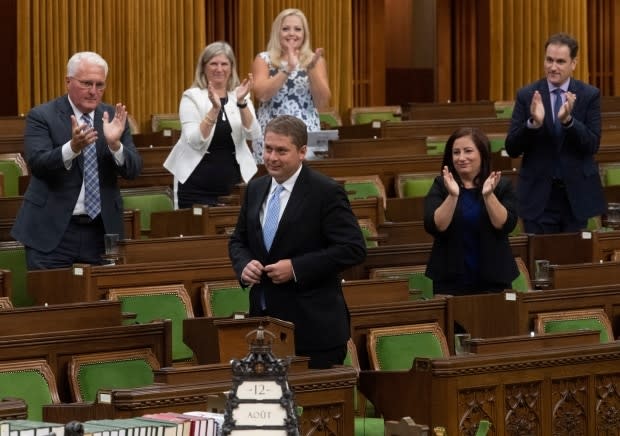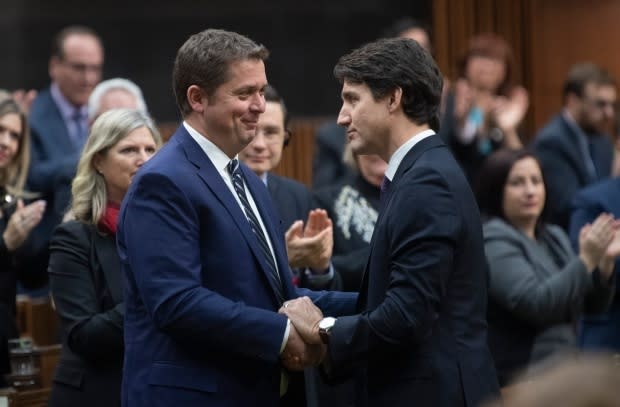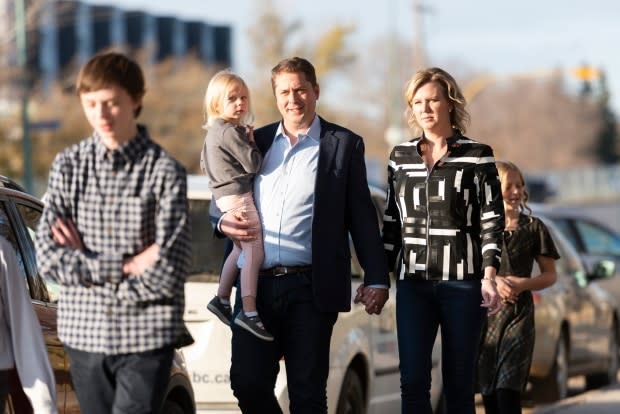Andrew Scheer warns Conservatives not to take party unity for granted as he prepares to exit stage right
Andrew Scheer says whoever succeeds him as Conservative leader next weekend will have to deal directly with the growing sense of Western alienation that's spawned the Wexit movement and talk of separation in Alberta.
"I do think that there's a real angst out there, there's a real sentiment of frustration and people are getting ready to give up or throw in the towel," Scheer said during a candid exit interview on CBC Radio's The House. "So I think the next leader of this party has to address that in a way that doesn't dismiss their concerns but shows them a plan forward as to how a Conservative government will fix these problems."
Scheer became leader just three years ago, winning a tight battle over Maxime Bernier, who subsequently quit the party to form his own. Bernier also did his best to undermine Scheer's Conservative credentials in the 2019 campaign, though Scheer had the last laugh when a Conservative defeated Bernier in his Quebec riding.
Still, that tight race — Scheer won by fewer than two percentage points — might have been a harbinger of his tumultuous time as Opposition leader.
Focus on energy policy
Even his promise to step aside hasn't gone smoothly. The planned June leadership convention was postponed because of the COVID-19 pandemic and replaced by the slimmed-down, physically distanced event in Ottawa, where the ballot results will be announced next weekend.
Four candidates are vying for his job. Political newcomer Leslyn Lewis, former cabinet ministers Peter MacKay and Erin O'Toole, and first-term MP Derek Sloan.
Scheer's advice to the winner is to begin by crafting an energy policy that will convince all Canadians of the importance of the West's oil and gas sector, that puts more value on domestic supplies than imports and presents a clear alternative to the Liberals.
"You don't have to be from Alberta to recognize that the world needs more Canadian energy. You don't need to be from Saskatchewan to believe that we shouldn't be importing oil from Saudi Arabia. We shouldn't be letting tanker after tanker after tanker of foreign oil come from countries with [a] terrible human rights record while we're telling Albertans that we can't build pipelines to get their energy to market."
Scheer, of course, made the same case in last year's election. It didn't move voters in central Canada then, though it did help the Conservatives rout the Liberals on the Prairies.

Party disunity
While a July poll by Environics suggests support in the West for "going it alone" is falling, an independence party based in Alberta and Saskatchewan could cut deeply into the Conservatives' base there, splitting the vote and giving the Liberals a potentially easier path to another victory.
Conservatives have seen that split play out before with the founding of Reform and, later, the Canadian Alliance. Vote splitting with the Progressive Conservatives helped the Liberals under Jean Chrétien win three straight majorities. The streak only ended when the two parties merged under Scheer's predecessor, Stephen Harper.
But party disunity isn't limited to geographic splits. The party — and Scheer — still struggle with social issues. And he was blunt when asked whether it's possible to stay true to your religious faith and lead a political party in Canada today.
"For sure," he said, arguing the reporters covering his campaign last year kept hammering away at his beliefs when it wasn't an issue.
"You know, it was frustrating to have several days' worth of questions from media and then seeing the stories saying, you know, 'Scheer was questioned again or was grilled again,' and it was like, 'Yeah, by you!' It wasn't by Canadian voters. My candidates weren't telling me that it was coming up at the doors. It wasn't like this is a burning issue among the electorate. It was reporters on the campaign trail that really tried to focus on it."

But even if the media played a big role in fomenting divisions over issues like abortion and same-sex marriage, Scheer acknowledged keeping the party together is no slam dunk.
"I think unity in the Conservative Party is something that you can never take for granted. It takes a conscious effort not only by the leader but every member of Parliament and every grassroots member to stay united and focus on the many things that we agree on," he said.
He insists the list of issues on which Conservatives agree is much longer than one containing those that divide the membership.
"When you look at the Conservative Party history, there are several times in history where we break apart and spend time in opposition in several different formations, and then we come back together — and when we come back together, we win. So I'm hopeful and I'm confident that the next leader will be able to do that and keep us united. Because that is the only way the conservative parties win."
Sights set on life back home
Scheer doesn't believe another split is imminent, even with the potential emergence of a Western-based separatist party.
But it won't be his problem. His priority now is to be at home more often; to reacquaint himself with the far corners of his sprawling Saskatchewan riding. He seems relieved to add "former" to his title.

Asked what he hopes Canadians will take away from his time at the helm and Scheer doesn't hesitate.
"I hope people remember the gains we made in the last election: going from 99 seats in 2015 to 121, going from 30 per cent of the vote to 34 per cent of the vote — and also the principled stands we took, when the Liberals were bringing in their tax hikes on small businesses," he said.
"We fought back for small business owners and people who work there. When they tried to sideline the opposition and remove the parliamentary oversight during this pandemic, we led the charge, making the case for Parliament as an essential service. So both in terms of the success of the party and the principled stance we took, I hope people remember that."
But memories, like Scheer's time as leader, can be shorter than we like. Especially in politics.


